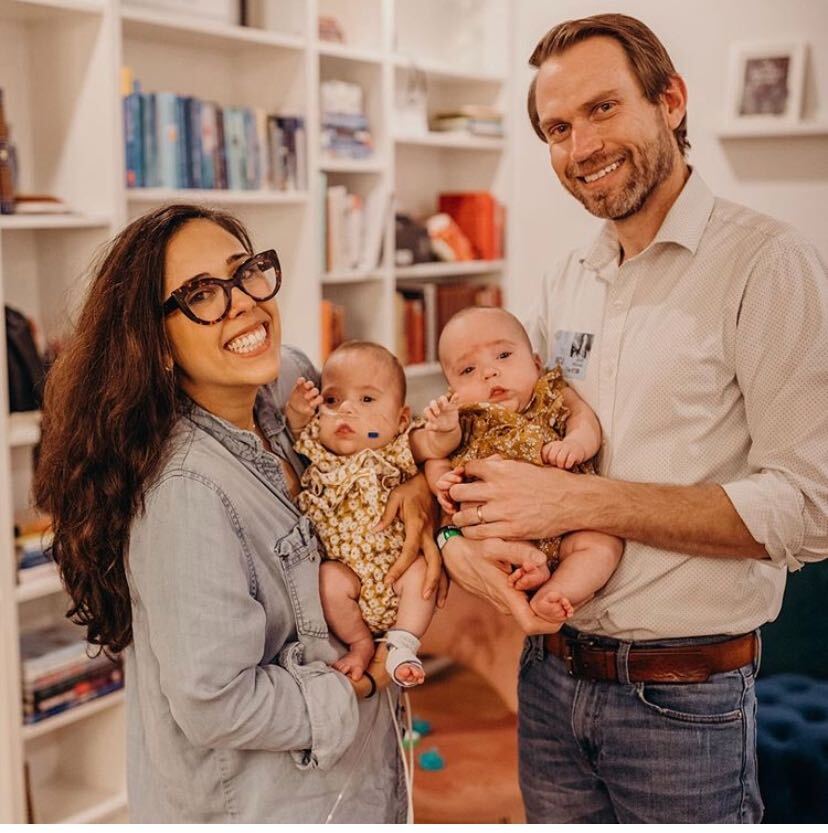
On December 14, 2019, four months before the due date of her twin girls, Laura Freedland went to the hospital with what she thought were Braxton-Hicks contractions. Though only 22 weeks pregnant, she quickly realized she was in active labor. After 16 hours, little Vivienne entered the world 17 weeks early, weighing only 1 pound, 4 ounces. Her sister, Margot, remained in utero without amniotic fluid for two more days until she went into distress and was born through an emergency C-section, also at 1 pound, 4 ounces. Both were incubated in the NICU, and Laura and her husband, Jared, prepared themselves for the worst.
Babies born at 22 weeks have about a 1% chance of survival, so it took incredible strength for the Freedlands to see the babies so small and so vulnerable to infection and injury. It was especially difficult for Laura to see so many other mothers go home with their babies, while having to leave Viv and Margot in the hospital.
Before the coronavirus hit, Laura, Jared, and both sets of their parents were able to visit the NICU. Their support was important for Laura, because Jared works during the day. Laura’s mother stayed by her side in the NICU, but after the start of the coronavirus pandemic, the hospital began to limit visitors to two per family, leaving Laura by herself with the girls during the day. “Developmentally, babies who have families who are engaged and active have better outcomes and development,” Laura said. The nurses’ job is to care for the babies clinically, but it is essential that NICU parents developmentally engage with their babies, so the loss of Laura’s mom’s support during the pandemic added enormous hardship to an already very taxing situation.
After 135 days in the NICU with Vivienne, the Freedlands were able to bring their beautiful little girl home. Laura describes the experience as “surreal,” because she had mentally prepared herself to lose both of her children, and knew that both would be able to come home.
Though life at home with a preemie would be difficult no matter the season, the difficulties of having Vivienne at home were dramatically exacerbated by COVID-19, since no one could come to their house or hold the babies. The girls are not likely to meet their aunts, uncles, or cousins for at least a year. Thankfully, the girls’ grandparents can come over, but they must maintain the utmost caution. Viv and Margot have extremely underdeveloped lungs, so it is essential that neither they, nor their parents, contract the virus.
Laura reveals that the greatest challenge they faced was the constant fear of the potential fatality of the virus. Though Vivienne was home, she was still at risk. As Margot continued to get better and moved toward being ready to join her sister at home, she too was as vulnerable to germs as ever.
Laura, however, said that whether she was in the NICU for 135 days, 150 days, or even 200 days, it is a privilege to be there “seeing God work miracles.”
The inspiring story of these twin miracle babies, Vivienne and Margot, is a beautiful example of faith lighting up a seemingly dark situation, and conquering the impossible. On July 28, 2020, after 224 days and nights in the hospital with baby Margot and countless struggles, she was released from the NICU, and the Freedland family was finally home together. As Laura so beautifully put it, “Having babies this premature is a long and emotionally draining road, but the way it has shaped my love for them is unbelievable.”
You can continue to follow their story on Instagram @vivandmargot.
See also:
- What to Expect When You Have a Preemie
- Predicting and Preventing Preterm Birth
- What Is Kangaroo Care, and How Can It Help Preemies?
By Elizabeth Troutman

